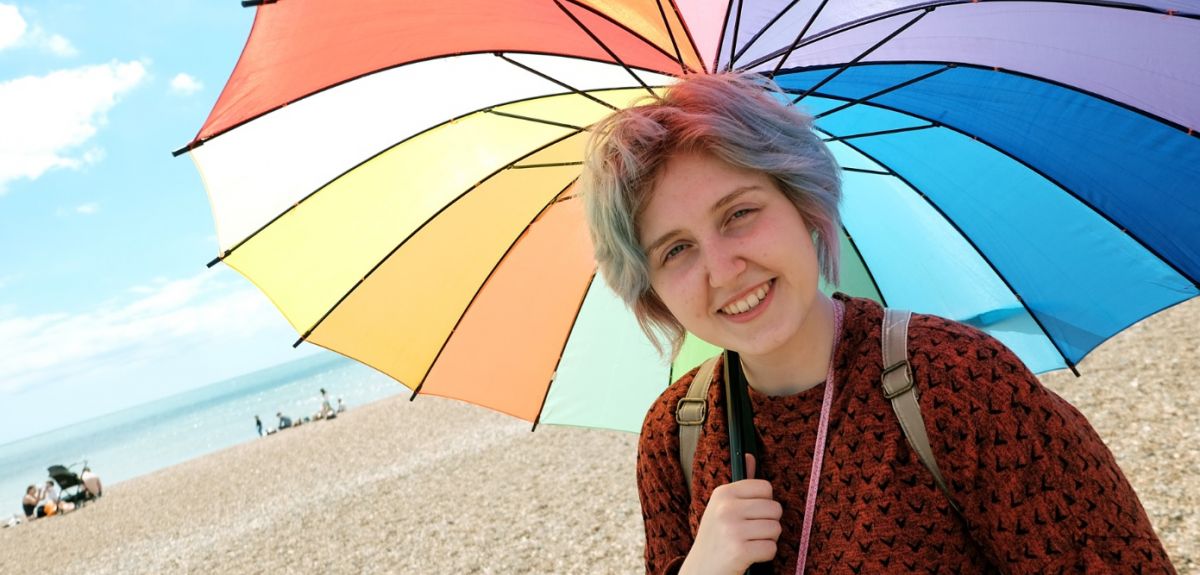
The English Literature student who founded a society for social anxiety, shyness and introversion
Our Student Focus series profiles the fascinating and varied activities of Oxford students. Miranda Reilly, an undergraduate studying English Literature, writes about balancing her studies with setting up a society for students with social anxiety, shyness and introversion.
'Starting my undergraduate English Language and Literature degree last academic year with undiagnosed social anxiety, an extreme shyness which I’d had since starting secondary school, I spent a lot of my first term feeling trapped in my room and isolated. I didn’t have much of a sense of purpose.
By around fifth week, I decided that I needed my own way to meet other students, so I set up SASI: the Social Anxiety, Shyness and Introversion Society. It was quite a success, and it was through this that I met a friend who introduced me to the Oxford University Student Union (OUSU)’s disabled students campaign, the Oxford Students Disability Community (OSDC).
My mum has been chronically ill since she was 20 with, among other conditions, an allergy to perfumes which ruled out being able to spend much time in rooms with air fresheners or rooms which had been cleaned with scented products, or around people who use scented laundry detergents and washing powders. I knew, therefore, a bit about invisible and rare disabilities before joining OSDC but little else, and hadn’t previously considered mental health as a disability.
Fast forward eleven months, and the majority of my friends at Oxford are involved in OSDC, working to improve things for themselves and other students, both through our campaigning and our socials which have created a strong community founded on accessibility and inclusivity.
Earlier this term we hosted our Disability Awareness Week, which included an arts exhibition which grew out of our fortnightly mental health art support group, Art for the Heart, and a panel of Oxford’s staff speaking on Pursuing Academia and Other University Careers – the audio and transcript for which will soon be available on our website.
Currently, we’ve been working on a Disability 101 Workshop to roll out across colleges and student societies because, while most students have good intentions, access needs are consistently forgotten about and events are often not accessible. Even if a student has excellent access to support for their academic studies, lack of access to the social and other student-run aspects of university life can lead to severe isolation and a lack of opportunities that can be added to a CV.
Later this year, our goal for UK Disability History Month (22nd November – 22nd December) is to get as many faculties, libraries and museums as possible involved, as some were for LGBTQ+ History Month, with displays and, hopefully, special lectures and talks.
Disability Studies is very much an emerging field and can be taken in many interdisciplinary directions including looking at representations of disability in literature, studying the role of music in deaf culture, and researching care for the disabled in ancient civilisations.
In my own academic studies, I am looking forward to being able to merge my interests in disability and English as I approach the final year of my degree, in which we have the most freedom to choose what we want to study, particularly with our dissertation.
Our Shakespeare paper consists of submitting three essays on any Shakespeare-related topics of our choice, and so I am certainly looking at staging disability in Shakespeare, such as with Othello’s epilepsy and Richard III’s scoliosis. Fiction – whether in the form of novels, television, cinema or another medium – has a massive impact on public perception, which can in turn lead to the very real consequences of changes to policies, laws and how people are treated in society.
Fictional portrayals of autism, for example, in addition to often portraying the spectrum inaccurately and as homogenous, have long perpetuated the stereotype that only Caucasian boys are affected, having the very real-world effect of BME people and girls on the spectrum being diagnosed at an older age, or not at all.
During my final year, I’m hoping to run for OUSU’s Vice President for Welfare and Equal Opportunities, an elected, paid position which lasts for a year after my degree and would allow me to dedicate a full-time job to working with the liberation campaigns, including OSDC, and welfare contacts across colleges.
Other than that, I’ve been looking into MA and MSc courses in Disability Studies, which go down a social policy route, but also haven’t ruled out an MA in English and a variety of career paths which do not require further academic study.
Outside of Oxford, people may assume that the university is all about academic work and nothing else, but it was only as a student here that I realised extracurriculars could be just as important and fulfilling as academic work, and could be combined with it to pursue paths which are still yet to be widely pursued.'